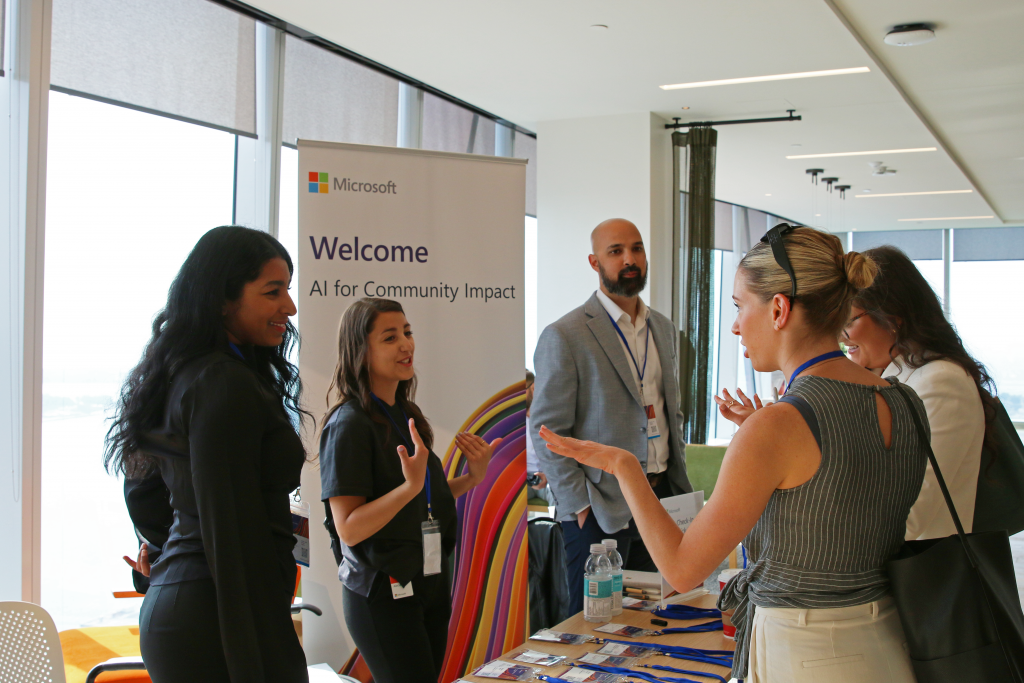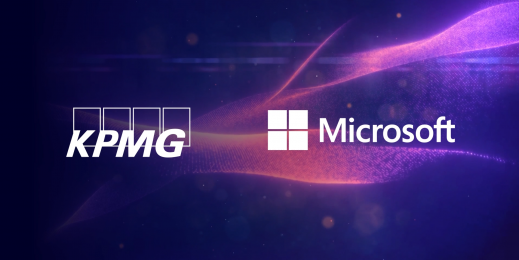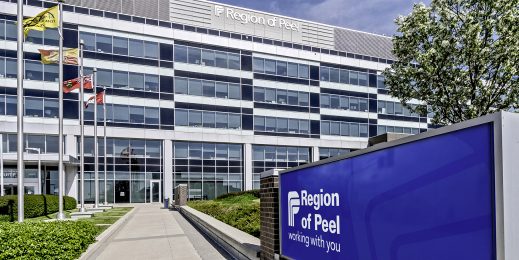
AI for Community Impact: The Power of Generative AI for the Non-Profit Sector
The non-profit sector is on the brink of a transformation, thanks to the advent of generative AI. This powerful technology is not just a tool for the corporate world; it holds immense potential for non-profits seeking to amplify their impact. This potential is especially critical as they navigate the so-called capacity crisis. This term captures the layered challenges nonprofits face today, including increased demand for services, staffing shortages, declining donations, and the mental health strain on staff. New AI productivity tools promise to alleviate some of these pressures by freeing up valuable time, allowing nonprofit staff to focus more on their core mission and make a greater impact in the communities they serve.
According to research from Imagine Canada, most Canadians believe that non-profits need to allocate resources, specifically funding to infrastructure investments, like technology and digital transformation to operate efficiently and advance their missions. This is good news, especially for social services, health and environment organizations where demand often outpaces capacity.
However, developing plans for Gen AI implementation and adoption poses a unique challenge for the nonprofit sector especially in areas like cybersecurity and AI governance. While leaders are figuring out their vision and plans for AI, 62% of Canadian employees that are already experimenting with AI at work. And, according to the latest Work Trend Index from Microsoft and LinkedIn, 79% of AI users are bringing their own AI tools to work, spurring a new “Bring-Your-Own-AI” (BYOAI) trend across the country.
While there’s clearly enthusiasm and interest in how AI can solve challenges and alleviate mundane, administrative tasks, it’s clear there is still much work to be done to empower the nonprofit sector for AI transformation.
Building on the momentum from the inaugural Global Non-Profit Leaders Summit that Microsoft hosted in Bellevue, WA, in late January 2024, Microsoft Philanthropies recently hosted leaders from Canadian non-profits at Microsoft Canada’s headquarters in Toronto. This event was an opportunity to continue the conversation about how AI capabilities can build the capacity of the sector and benefit non-profits of all sizes. The event featured workshops where nonprofit leaders could discuss their concerns and excitement about AI with their peers, providing a platform for learning, problem-solving, and reimagining how non-profits can thrive in an AI-driven world.
The day’s agenda was packed with inspiring conversations and hands-on workshops, offering attendees actionable insights and practical tools for navigating AI, whether they are advanced or just beginning their journey. The event began with a keynote on Microsoft’s approach to responsible AI by John Weigelt, National Technology Officer at Microsoft, followed by sector insights from Bruce MacDonald, President and CEO of Imagine Canada. Discussions on AI frameworks and community-building resources, along with opportunities for networking and collaboration, rounded out the day.
Insights from Non-Profit Leaders on AI Adoption
While many attendees are at the start of their journey, they are already seeing the benefits of Gen AI in various ways. Organizations are streamlining processes, automating administrative tasks, and enhancing program delivery to maximize operational efficiency, allowing them to focus more on their communities, their mission and the people they serve. Here are some perspectives from event attendees.
March of Dimes Canada
VJ McEwen, Director of IT and Infrastructure at March of Dimes Canada, is enthusiastic about the potential for AI to streamline operations and increase productivity for staff. By leveraging tools like Microsoft Copilot, March of Dimes Canada is exploring AI applications in areas such as meeting summaries and note-taking.
“We’re at an inflection point, similar to when the internet became widespread,” he said. “Using AI for administrative tasks is already saving our employees time, allowing them to focus on more impactful work.”
To ensure a thoughtful and secure approach to AI implementation, the organization has formed a dedicated cross-functional AI working group. This group focuses on governance, policies, and understanding the AI landscape to address potential challenges, such as data security and bias in the disability space. Despite being in the early stages, employees piloting the tools are already experiencing the benefits. They are curious about the potential of AI and keen to learn more.
McEwen notes that the pilot phase has revealed significant time-saving opportunities, particularly for tasks like generating content and creating meeting recaps, empowering staff to devote more time to their core mission: improving the lives of people with disabilities.
Big Brothers Big Sisters of Saskatoon and Area
Big Brothers Big Sisters of Saskatoon and Area is at the early stages of its AI journey, but the potential benefits are already clear. Kim Megyesi, CEO of Big Brothers Big Sisters of the Saskatoon Area, is enthusiastic about the potential for AI to streamline operations so the organization can match more young people with mentors every year.
“If we can increase our productivity with AI, it means more human-to-human connections and better-supported matches, ultimately leading to more young people getting mentors,” she said.
Megyesi said the organization is exploring the use of AI in areas like volunteer recruitment and matching mentors with mentees. “Today, matching kids with an appropriate mentor is a very manual process. We’re looking at how we can use AI to speed up this process while still ensuring we’re doing everything possible to ensure any match achieves the outcomes we want,” she said.
Today, staff spend a large amount of time on things like case noting, proposal writing and data analysis – all areas where AI can alleviate some of the administrative burden. “We’ve identified the pain points where we think tools like Copilot could be a solution, but making sure we have guardrails in place is a critical next step,” she said.
Looking ahead, the organization hopes to use AI-enabled tools for data collection and analysis to help them obtain new insights, assess implications of program changes and inform the way they approach prospective donors. Megyesi mentions, “We are looking into using AI for data mining in our communities to identify donor profiles and increase our success with direct mail campaigns.”
Megyesi says that Big Brothers Big Sisters of Saskatoon and Area has always had a culture focused on training and development and their commitment to AI will be the same. “We recognize that there is a knowledge gap with AI which is why we are committed to upskilling our employees,” said Megyesi. “We know that AI can help us solve business challenges and we are committed to doing so responsibly. Our goal is to ensure that AI-enabled tools help us enhance the human element of our mission.”
NPower Canada
NPower Canada, an organization committed to enhancing economic prosperity for individuals facing barriers to employment, is leveraging Gen AI to support bridging the gap of skilled talent to tech and tech-enabled jobs. With a mission to launch individuals into meaningful and sustainable careers, NPower Canada has successfully helped over 10,000 jobseekers across six provinces gain essential tech skills and long-term career growth opportunities. Their programs not only focus on technical training but also on comprehensive professional development, including communication skills, problem-solving, financial literacy, and people management. As NPower Canada COO Nisha Lewis states, “Our work is human centered so when we think about AI, we know there are things it can’t replace. But we want to use AI to help staff have the time, energy and space so they can focus on the work that makes the biggest difference.”
While NPower Canada is in the early stages of their AI journey, the team envisions a future where Gen AI tools will play a crucial role in their operations. For example, the organization receives around 18,000 applications annually and interviews over 3,000 candidates. AI can help automate parts of this process, ensuring that valuable human interactions are preserved while increasing efficiency.
“If we can automate parts of intake process – the reporting, case noting – that frees staff up to focus on helping participants with interview prep and mock interviews,” says Nisha. This automation allows career specialists to focus more on personalized support, enhancing the overall quality of service provided to job seekers.
NPower Canada’s use of AI extends beyond operational efficiencies. They are also exploring AI’s potential in data analysis to remove backlogs and improve strategic planning. The organization is mindful of potential biases and is dedicated to ensuring that AI tools do not exclude individuals who need the most support. As Molly Hill, VP of Development, emphasizes, “We don’t want to leave anyone behind.”
By integrating AI into their curriculum, NPower aims to prepare participants for the future of work, equipping them with both technical and soft skills necessary for career advancement. This holistic approach not only makes the program more agile and innovative but also ensures that participants are ready to seize new opportunities in the tech industry.
Empowering People and Organizations
At Microsoft, we are committed to expanding opportunity to help people and organizations harness the power of AI and other breakthrough technologies. We are focused on building the capacity of organizations that are key to driving inclusive economic growth.
The insights gleaned from AI-driven data analysis are empowering organizations to make informed decisions, predict giving patterns, and tailor their initiatives to meet the needs of those they serve. If your organization is looking to get started with AI, we have a range of resources to help you including information on Responsible AI Practices, an AI Compass for Nonprofits, NGOs and Foundations which can generate a personalized benchmarking report and a Digital Gen AI Adoption Framework and use-case adoption toolkit.
You can also find more information about how to Empower Your Non-profit with AI or get more information in The Microsoft Digital Skills Centre for Nonprofits.
We also invite you to connect, learn and innovate together through the Nonprofit Community Nonprofit Community (microsoft.com)










